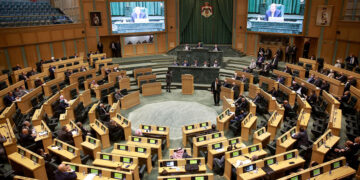Sarah Leah Whitson is the Executive Director of DAWN.
Biden's announcement of resumed offensive weapons sales to the Kingdom says it all
*Published in Responsible Statecraft on August 16, 2024
Perhaps we should be grateful that it took President Biden over four years to fully abandon his campaign pledge to end arms sales to Saudi Arabia, eroding the promise bit by bit before finally announcing at the end of the day on Friday, August 9, that the administration would resume sales of offensive air-to-ground munitions to the Kingdom.
In reality, the ban was merely the last vestige of a long-abandoned policy to isolate and sanction Saudi Arabia for its various gruesome atrocities and abuses both at home and abroad. In its place, the Biden administration's courtiers doubled down on their embrace of Crown Prince Mohamed bin Salman (MBS), offering up a never-ending basket of concessions and goodies, as the golden ticket for continued U.S. primacy in the Middle East, come what may to everyone and everything else.
What follows will be their rush to the finish line, bestowing on the prince the biggest prize of all — an unprecedented U.S. security guarantee — before the clock runs out on Joe Biden's presidency.
Cutting off the biggest U.S. weapons purchaser in the world carried well-understood costs of its own, upsetting not only U.S. defense companies deprived of the Saudi cash cow, but also encouraging MBS to retaliate by flaunting closer ties with China and Russia. And so just a few months into the first year of the Biden administration, his national security team walked back the arms embargo, clarifying that they only intended to block "offensive" weapons, not "defensive" ones.
Queries from members of Congress about the distinction between these terms went unanswered. Soon, billions in weapons were flowing, paving the way for a further mending of relations with the Saudi ruler, culminating in the now infamous July 2022 Biden/MBS "fist bump" in Jeddah.
Once the Biden team announced that it too would follow Trump's lead to make adding Saudi Arabia to the Abraham Accords its number one Middle East foreign policy priority, any lingering concerns about rewarding the Kingdom with new military support despite its widespread horrors in Yemen and at home, or fueling its further belligerence in the region, were swept under the desert sands.
Coupled with national security adviser Jake Sullivan's open admission of his secondary priorities — cheap oil and keeping China out of the region — the only answer to MBS's "jump" was to ask "how high?" MBS turned to a hardball game of reverse leverage, not only refusing to open his oil spigot to relieve global oil prices ahead of the 2022 November primaries despite Biden's pleas, but prominently hosting Chinese President Xi Jinping in a multiday red carpet affair, announcing China would build a civilian nuclear plant and support missile development in the country, and refusing to sanction Russia for its invasion of Ukraine.
And so it was time for the Biden team to bow to MBS's wishes. The first major concession was to grant the Crown Prince immunity from U.S. prosecution, squashing several lawsuits against him for the murder of Jamal Khashoggi, the attempted murder of Saad Aljabri, and the targeted harassment and attacks against Al-Jazeera journalist Ghada Oueiss. The next was for the Biden team to secure the ultimate prize in the Saudi bucket list: a NATO Article 5 treaty level U.S. security guarantee for the Kingdom. Efforts by the Biden team to woo the Crown Prince with a mere aerial security umbrella were not sufficient to persuade him; only a bilateral, treaty level guarantee would work, he made clear.
Subscribe now to our weekly round-up and don't miss a beat with your favorite RS contributors and reporters, as well as staff analysis, opinion, and news promoting a positive, non-partisan vision of U.S. foreign policy.
The Hamas attacks on Israel on October 7, and the nine months of relentless Israeli bombardment and starvation of Gaza's civilian population that it precipitated, upended these plans. A humiliated Sullivan, who only days before the cataclysmic assault pronounced that the Middle East was "quieter today than it has been in two decades now" and boasted that "the amount of time that I have to spend on crisis and conflict in the Middle East today compared to any of my predecessors going back to 9/11 is significantly reduced," was forced to shelve the plans for a Saudi/Israeli peace agreement.
Even MBS could not dare to openly endorse Israel in the face of near universal Saudi sympathy for Palestinian suffering.
While a largely AIPAC-funded Congress would likely have supported a U.S. security guarantee for Saudi Arabia in exchange for its joining the Abraham Accords, without this, ratification of a treaty level commitment would be a very hard sell. The Biden team is now considering the idea of delinking the security guarantee, as well as poaching China's development of the civilian nuclear plant, from normalization with Israel in a "less for less" deal.
Under a proposed "Strategic Alliance Agreement" the U.S. would commit to helping defend Saudi Arabia if it were attacked, in exchange for Saudi granting Washington access to Saudi territory and airspace, prohibiting China from building bases in the Kingdom or pursuing security cooperation with it, and signing a parallel "Defense Cooperation Agreement," to boost weapons sales, intelligence sharing and strategic planning on terrorism and Iran.
Such a move strips away the cover of "regional peace for Israel" as the motivation for the Saudi security guarantee, more nakedly exposing the underlying motivations driving the Biden team: a stale but cemented worldview that U.S. interests require military hegemony in the Middle East, alongside cheap oil and defense industry profits. It's hard to discount the siren call of personal profiteering for Biden officials, who will no doubt consider multi-million payouts from the UAE and Saudi, even if they're not as lucrative as the billions in take-home by Trump officials Stephen Mnuchin and Jared Kushner. (Recall also that Secretary Blinken's WestExec Advisors, whose client list Secretary Blinken has never disclosed, is now partly owned by Teneo, a firm that works for the MBS controlled Saudi public investment fund.)
It appears that the decades of costs in arming and defending dictatorships in the Middle East — from the mass slaughters of civilians and perpetual war-footings, encouraging destabilizing bellicosity, entrapping our country in zero-sum military conflicts, and undermining U.S. global standing as a credible force for human rights and democracy — remain entirely lost on the Democratic leadership.
With the clock ticking on the expiration of the Biden term as the Gaza war rages on, it's doubtful that the administration will be able to deliver any expansion of the Abraham Accords or a security agreement for MBS. It's not even clear MBS will accept these rewards, saving them for the next round of haggling with a new administration. For now, we'll just have to hope that "Mr. Bonesaw" will show more sense than the Biden administration and avoid any new wars in the region.





































